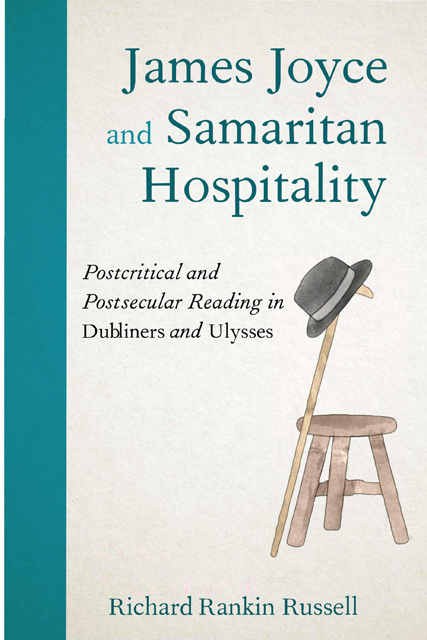Book contents
- Frontmatter
- Contents
- Preface and Acknowledgments
- List of Abbreviations
- Introduction
- 1 Haunted by Hospitality in “The Dead”
- 2 Joyce, Scripture, and Autobiographical Rescue Narratives
- 3 Rewriting the Good Samaritan Parable: The Fictional Rescue Narratives of “Grace” and “Circe”
- 4 Bloom as Stranger and Samaritan in “Cyclops,” “Oxen of the Sun,” and “Circe”
- 5 “In orthodox Samaritan fashion”: The Parabolic Encounter between Stephen and Bloom in “Eumaeus”
- 6 Home to “Ithaca” and “Penelope”: Bloom’s Hospitality and Stephen and Molly’s Reactions
- 7 Enfleshed Ethics and the Responsibility of the Reader in the Good Samaritan Parable and the “Nostos” of Ulysses
- Coda: “Go thou and do likewise”: Postcritical and Postsecular Reading through a Joycean Hermeneutics of Hospitality
- Works Cited
- Index
7 - Enfleshed Ethics and the Responsibility of the Reader in the Good Samaritan Parable and the “Nostos” of Ulysses
Published online by Cambridge University Press: 25 April 2023
- Frontmatter
- Contents
- Preface and Acknowledgments
- List of Abbreviations
- Introduction
- 1 Haunted by Hospitality in “The Dead”
- 2 Joyce, Scripture, and Autobiographical Rescue Narratives
- 3 Rewriting the Good Samaritan Parable: The Fictional Rescue Narratives of “Grace” and “Circe”
- 4 Bloom as Stranger and Samaritan in “Cyclops,” “Oxen of the Sun,” and “Circe”
- 5 “In orthodox Samaritan fashion”: The Parabolic Encounter between Stephen and Bloom in “Eumaeus”
- 6 Home to “Ithaca” and “Penelope”: Bloom’s Hospitality and Stephen and Molly’s Reactions
- 7 Enfleshed Ethics and the Responsibility of the Reader in the Good Samaritan Parable and the “Nostos” of Ulysses
- Coda: “Go thou and do likewise”: Postcritical and Postsecular Reading through a Joycean Hermeneutics of Hospitality
- Works Cited
- Index
Summary
There is something special in the way Ulysses not only constitutes a journey in terms of a narrative but also embodies a journey for the reader.
David Pierce, Reading Joyce, 299The import of a text is not exhausted by what it reveals or conceals about the social conditions that surround it. Rather, it is also a matter of what it sets alight in the reader—what kind of emotions it elicits, what changes of perceptions it prompts, what bonds and attachments it calls into being.
Rita Felski, The Limits of Critique, 179Declan Kiberd has argued that Joyce believed Ulysses would “invent a new sort of reader, someone who after that experience might choose to live in a different way. He wanted to free people from all kinds of constriction, among them the curse of passive readership.” By perceiving Bloom’s encounter with Stephen through the intertext of the Good Samaritan parable, with its emphasis on the need for the hearer to respond, we ourselves are expected to respond in some way; in so doing, in connecting with Stephen and Bloom, we help continue the parable’s action into the present. Joyce thus expects and depends upon our read-erly labors. Arguing that “disconnectedness” is the “anxiety that Ulysses massively struggles to transcend,” Leo Bersani posits that “Joyce’s dependence on his readers is most pronounced, for it is their intra- and extratextual work that reconstitutes his mind as the serene repository of the resources of our language and culture.” Much of Joyce’s success in conveying his message of hospitality and loving our neighbor depends upon our response, which is unquantifiable finally, but still worth examining. If Ulysses exemplifies a particular kind of wisdom literature, as Kiberd argues throughout Ulysses and Us, then by so doing, it also seeks to inculcate a new ethical responsibility—and even agency— in readers because of what we have learned about treating those different from ourselves in its pages. In this regard, Virginia Moseley was the first critic to argue for Joyce employing his retelling of the Good Samaritan parable to reach the reader, even to rescue the reader. She reads “Eumaeus” through Jesus’ walk to Emmaus, concluding that Joyce himself “‘bucks up’ his reader ‘generally in orthodox Samaritan fashion, which he very badly’ needs.
- Type
- Chapter
- Information
- James Joyce and Samaritan HospitalityPostcritical and Postsecular Reading in Dubliners and Ulysses, pp. 180 - 197Publisher: Edinburgh University PressPrint publication year: 2023



